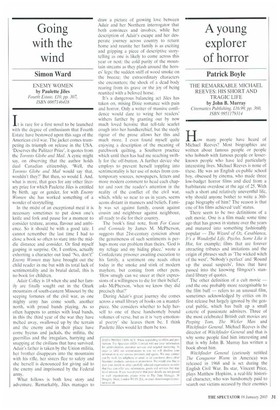Going with the wind
Simon Ward
ENEMY WOMEN by Paulette Tiles Fourth Estate, £10, pp. 307, ISBN 0007146418 It is rare for a first novel to be launched with the degree of enthusiasm that Fourth Estate have bestowed upon this saga of the American civil war. The jacket comes trumpeting its triumph on release in the USA. 'Deserves the Pulitzer Prize', it quotes from the Toronto Globe and Mail. A cynic might say, on observing that the author holds dual Canadian citizenship, 'Well, the Toronto Globe and Mail would say that, wouldn't they?' But then, so would I. And, what is more, that goes for any other literary prize for which Paulette Jiles is entitled by birth, age or gender, for with Enemy Women she has worked something of a wonder of storytelling.
In the midst of an exceptional meal it is necessary sometimes to put down one's knife and fork and pause for a moment to consider texture, aroma, flavour and ambience. So it should be with a good tale. I cannot remember the last time I had to close a book so often to stare into the middle distance and consider. Or find myself gasping in surprise. Or, I confess, actually exhorting a character out loud 'No, don't!' Enemy Women may have brought out the child reader in me but with its total lack of sentimentality and its brutal detail, this is no book for children.
Adair Colley is 18 when she and her family are finally sought out in the Ozark mountains of south-eastern Missouri by the seeping fortunes of the civil war, as one mighty army has come south, another north, with proud bands playing. As so often happens to armies with loud bands, in this the third year of the war they have melted away, swallowed up by the terrain and the enemy and in their place have come hyenas and jackals, the militia, the guerrillas and the irregulars, harrying and snapping at the civilians that have survived. Adair's father is taken by the Union militia, her brother disappears into the mountains with his rifle, her sisters flee to safety and she herself is denounced for giving aid to the enemy and imprisoned by the Federal army.
What follows is both love story and adventure. Remarkably, Jiles manages to draw a picture of growing love between Adair and her Northern interrogator that both convinces and involves, while her description of Adair's escape and her desperate journey across country to return home and reunite her family is as exciting and gripping a piece of descriptive storytelling as one is likely to come across this year or next: the cold purity of the mountain streams as they plash around the horses' legs; the sudden sniff of wood smoke on the breeze; the extraordinary characters she encounters; the shock of a dead body rearing from its grave or the joy of being reunited with a beloved horse.
It's a dangerous balancing act Jiles has taken on, mixing Dixie romance with pain and horror. Only a writer of massive confidence would dare to wring her readers' withers further by granting our by now much loved heroine that tell-tale scarlet cough into her handkerchief, but the steely rigour of the prose allows her this and much more, I even found myself quite enjoying a description of the meaning of patchwork quilting, a Southern practice which until then has had me reaching swiftly for the off-button. A further device she employs to prevent herself toppling into sentimentality is her use of notes from contemporary sources, newspapers, letters and more modern comment to head each chapter and root the reader's attention in the reality of the conflict of the civil war, which, while so near to us in years, seems aeons distant in manners and beliefs. Family was set against family, cousin against cousin and neighbour against neighbour, all ready to die for their country.
The book's final note, from For Cause and Comrade by James M. McPherson, suggests that 21st-century cynicism about the genuineness of such sentiments is perhaps more our problem than theirs. 'God is my refuge and my hiding place,' wrote a Confederate prisoner awaiting execution to his family, a sentiment one reads often today in the smoke and stink of modern mayhem, but coming from other pens. 'How smugly can we sneer at their expressions of a willingness to die for their belief', asks McPherson, when we know they did precisely that'?"
During Adair's great journey she comes across a small library of books on a mantelpiece. She considers whether to help herself to one of these handsomely bound volumes of verse, but as it is 'very emotional poetry' she leaves them be. I think Paulette Jiles would let them be too.
DATA PROTECTION ACT. When responding to offers and promotion, The Spectator 11828) Limited will use your information for administration, customer services and targeted marketing_ In order to fulfil our commitments to you we will disclose your information to our service providers and agents. We may contact you by mail, fax telephone or entail to lot you know about other Spccimor products. services c■ipromotions. We would also like to pass your details to other carefully selected organisations in order that they can offer you information, goods and services that may be of interest. If you would prefer that your details are not passed to such oreanisations, please write to The Data Manager. 56 Doughty Street, London WC I N 2LL. or email donamanagerq spectator.co, Sib


























































 Previous page
Previous page